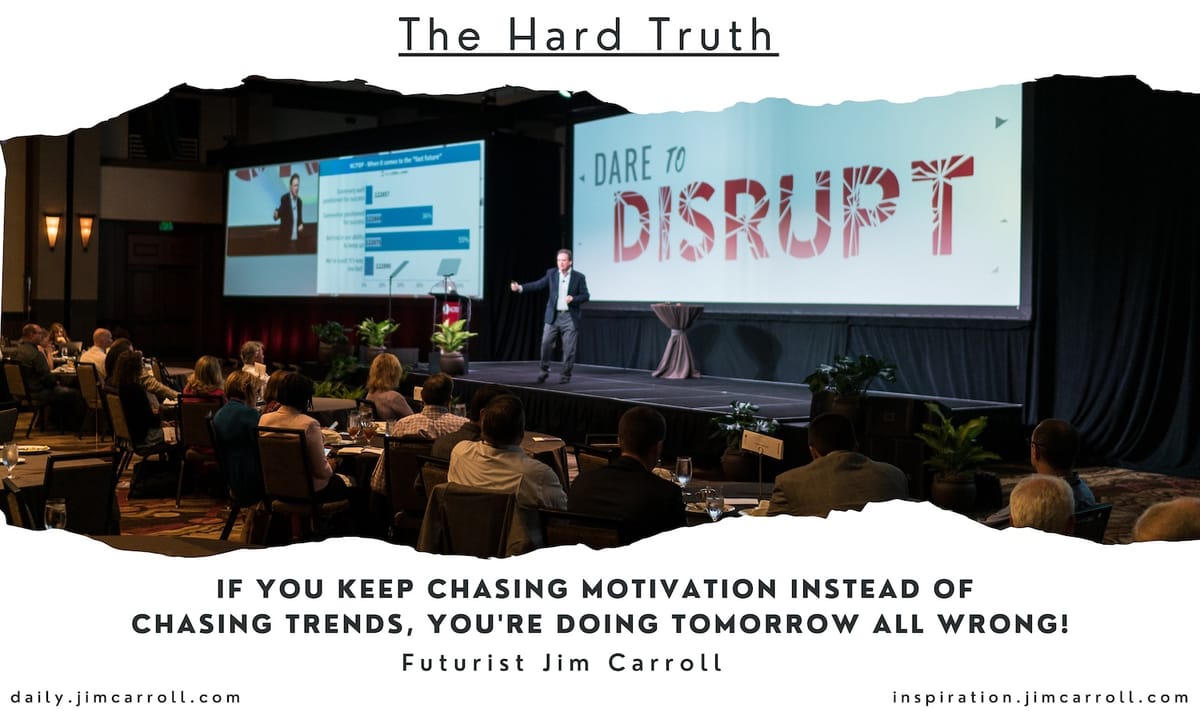"If you keep chasing motivation instead of chasing trends, you're doing tomorrow all wrong!" - Futurist Jim Carroll
One of the most interesting - and perhaps one of the most common - situations in my line of work is when you get contacted by a potential client for a detailed talk on the trends that will impact them - and then at the last minute, they suddenly veer off in a different direction!
"We need a futurist with a message on the core trends of tomorrow" they will say when first contacted. "We are faced with some pretty significant issues, and need to make sure that our team is aligned to the trends that will impact them!"Then, after a time, they come back: "We decided to go with a motivational speaker!"
It is, as they say, LOL.
I was reminded of this just the other day when I was contacted by one of my Canadian bureaus - they had a bank that was looking for a keynote speaker on trends that will be impacting them. Just a little bit later, word came back that they decided they didn't want a session on the future, but rather, a motivational speaker. This happens to be a running joke for me (a Canadian) and many of the Canadian agencies that have booked me. Most organizations in Canada tend to look for motivation rather than trends. It's a different situation in the US, which is why I turned my business model to that market well over two decades ago.
One of the conclusions that I came to a long time ago from this odd state of affairs is that there's a very real difference between the two countries (and I can see the same situation with the other countries where I do my work.) US clients and the leadership teams that drive them seem to be relentlessly focused on trends, tomorrow, disruption, and the ideas, challenges, and opportunities that they need to focus on to get there.
Canadians organizations? Give them a hockey player with a motivational story and they're on board!
The fact is, some organizations tend to try to avoid confronting the reality of tomorrow, and instead, choose to gloss things over, both in their corporate leadership meetings and in their strategic planning. They are highlighted by a weak leadership team that prefers to keep doing what they've always been doing, rather than doing what should be done. They would much rather think about the glories that got them to yesterday rather than the hard truths that might let them thrive tomorrow. They prefer to try to motivate their team into tomorrow, rather than helping the team think about the disruption that they will face on that voyage to tomorrow.
They aren't prepared to think about the 24 cold hard facts that determine their future:
What's the message inherent in this video? No one company can do everything that needs to be done in an era of fast change. Individually, any trend is disruptive. Combine them, and it’s transformative. When everything connects, power disperses. Legacy is death: agility and speed are the new metrics for success.
Disruption is real, it’s big, and it’s happening faster than you think.
The sad truth is that you can try to motivate yourself into a better tomorrow, but if you don't have a really good idea of what it will look like when you get there, you might not get there in good form!
Hockey, anyone?
Unlike other Canadians, Futurist Jim Carroll doesn't watch a lot of hockey.

